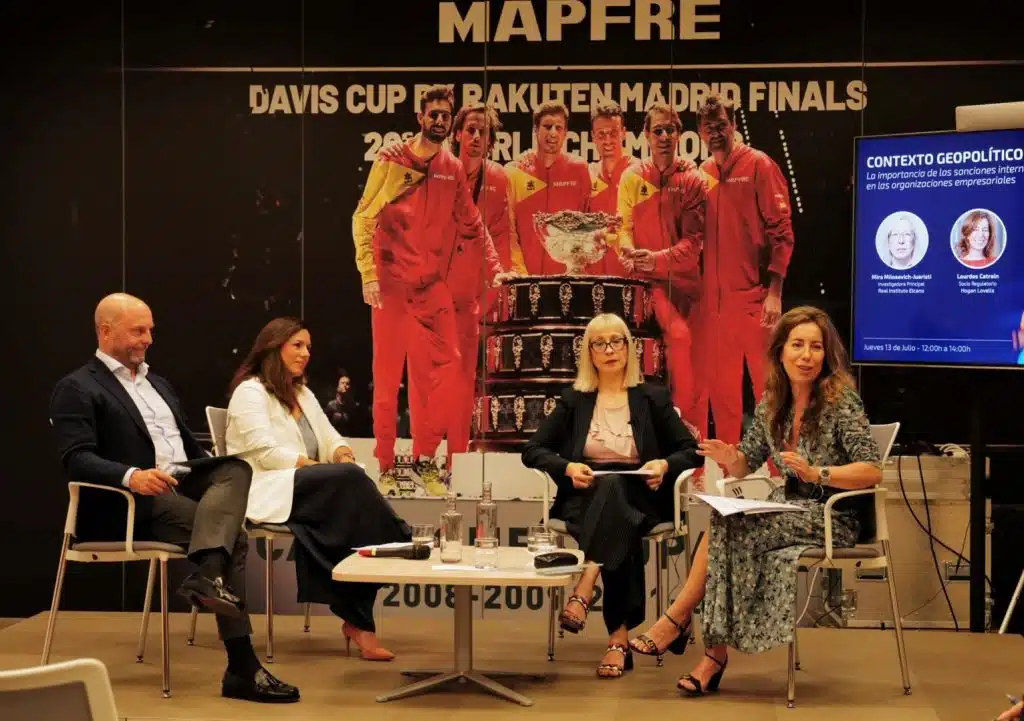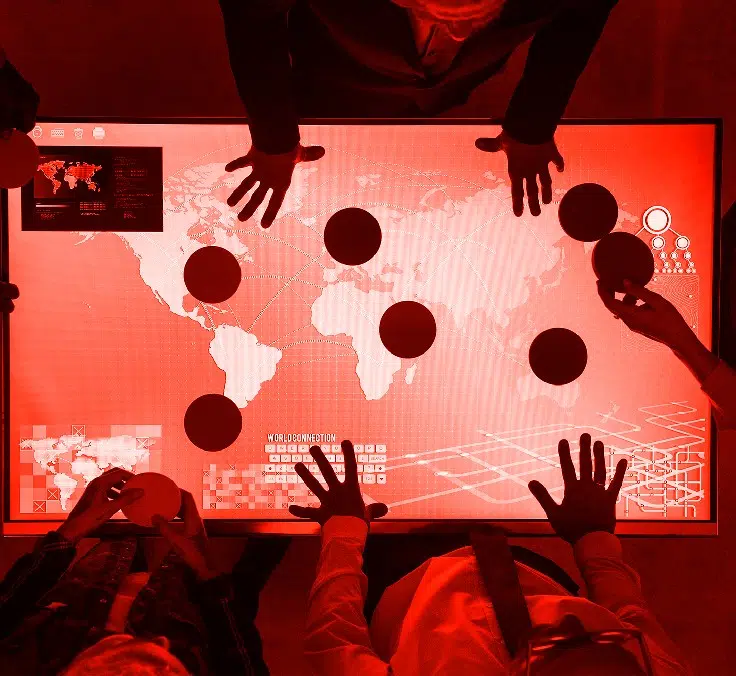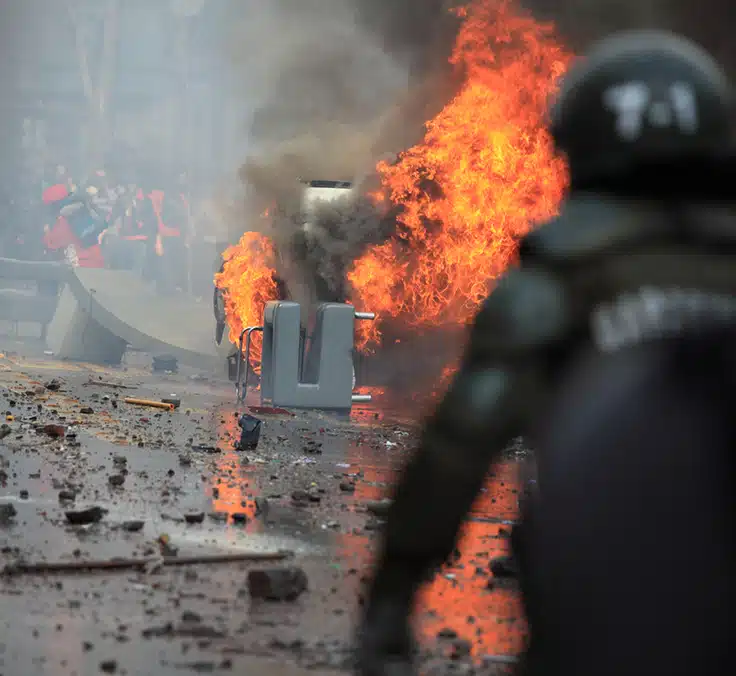ECONOMY| 25.07.2023
Geopolitics’ hostile takeover of economics and law

Julia Gómez de Ávila Segade
MAPFRE Global Risks
Last Thursday, July 13, MAPFRE’s Head Office brought together Mira Milosevich-Juaristi, senior researcher at the Elcano Royal Institute, and Lourdes Catrain, regulatory partner at Hogan, to analyze the current geopolitical context.
Accompanied by Juan José Pedraza Laynez, Corporate Legal Director of MAPFRE Spain, and Laura González, Legal Director of MAPFRE Global Risks, they addressed an audience of more than 80, including Bosco Francoy, CEO of MAPFRE Global Risks.
The panel was opened by Mira Milosevich, who spoke about the geopolitical context and how the war in Ukraine has highlighted a geopolitical risk for companies that, in her opinion, was not so present before. She began by defining the concept of world order and its fragmentation. “When I refer to world order, I mean the distribution of power. And where do we see fragmentation? In the rise of the revisionist powers, who do not agree with the status quo of the international order,” created and sustained by the United States (US) after World War II and the Cold War. These revisionist powers — including Russia, China, and Turkey – want to disrupt it.
She argued that we are witnessing a consolidation of the West and a further fragmentation of the rest of the world, which does not want to choose a bloc, as it wishes to belong to none and to choose its alliances on an ad hoc basis. “Whatever is in the national interest of these countries at any given time.”
Ukraine, sanctions, and uncertainty
Returning to the Ukrainian war, she noted that neither actor has changed its political objectives: Russia wants to prevent Ukraine’s rapprochement with the West, and Ukraine wants to defend its territory. She added: “At the strategic level, no country has defined what a victory would be, which makes it difficult to analyze from the outside; at the tactical level, the Ukrainian offensive is progressing more slowly than expected, according to the Ukrainian president.”
Despite the fact that 141 countries have already condemned the Russian invasion, not all have imposed sanctions, for different reasons. She thinks that “the biggest loser” of the war in Ukraine is Europe. “The European Union (EU), and Spain as a member, is in a delicate situation following the end of the German model (cheap gas from Russia, trade with China, and security and defense guaranteed by the US), as it is in danger of undergoing serious de-industrialization.” According to Milosevich, the EU faces three uncertainty-filled issues: the US elections in 2024, the outcome of the war in Ukraine, and the role of the EU vis-à-vis China and the US.
Towards the end of her presentation, the researcher from the Elcano Royal Institute stressed the distinction between two terms: “While the US is still the world’s only superpower, I think the concept of power is being confused with the concept of influence, and the US is losing influence. This is due to its own mistakes and to the rise of the revisionist powers.”
Finally, when referring to the EU’s recent publication on economic security strategy, she noted: “There is a lot of geopolitics and very little economics; in a free market system, that means a lot of regulation.” She recalled that there is no supranational European government that is going to control everything, so “it becomes about national security, transatlantic security… This is further proof of how geopolitics has launched a hostile takeover of the economy, as everything is becoming about national security.”
Russia and the Security Council
The second part of the presentation by Lourdes Catrain was devoted to law. Catrain welcomed Milosevich’s perspective on the hostile takeover: “Geopolitics has also launched a hostile takeover of the law.”
She began her presentation by addressing the legal framework of sanctions, since, on the one hand, 141 countries are against the invasion, but sanctions have to be approved by the UN Security Council. “Of the five members, one is Russia. What is the result? They don’t even bother to show up.”

From left to right, moderators Juan José Pedraza Laynez and Laura González, from MAPFRE España and MAPFRE Global Risks, respectively, together with speakers Mira Milosevich-Juaristi and Lourdes Catrain, during the talk.
We came into the Russia conflict “almost orphaned,” in her view, “but not totally because we have the US, which, in legal matters, is a superpower, whether we like it or not.” On the one hand, because it is a single country, unlike the 27 EU countries which have their corresponding political and legal differences. On the other hand, the US has been applying sanctions “in a very sophisticated way” for 30 years—sanctions in Europe start to be applied in 1993 with the Maastricht Treaty—. At this point, the expert diverged from Mira’s speech: “The US is a superpower because of the dollarization of the world economy. This, in terms of sanctions, is extremely important because whenever there is a transaction in dollars, it means that American sanctions apply. And Europe is trying to get the euro to replace the dollar in the economy.
Sanctions
Catrain defined the legal framework as “extremely complex.” It started on February 23, 2022, and, as of today, 11 sanctions packages have been presented, the last of which came on June 23, 2023. The outset of 2022 brought a unique situation with the war in Ukraine: “Europe comes out of nowhere with some very, very novel ideas of how to do as much damage as possible to Russia with sectoral sanctions that are unique and much, much tougher than US sanctions.”
First, banks begin to be sanctioned through asset freezes. Furthermore, the import and export of goods is banned. The same applies to the automobile industry, which particularly affects the German and Spanish industries.
“Not content with asset freeze measures—the expert continues—transaction banks were set up in the EU to get their hands on Rosneft without applying the asset freeze, since the German economy was dependent on Russian gas and could not do without it overnight.” This justifies the so-called legal creativity: “Asset freeze rules say that if subsidiaries have more than 50% ownership or can exercise control, they are also subject to the asset freeze, unless proven otherwise, so the EU was subjecting European companies to the asset freeze. What was done? Legal creativity A kind of comprehensive monitoring led by Germany so that European subsidiaries could continue to operate under an independent auditor.
An unresolved issue is the lack of resources mobilized to research regulations, as they are devised in each country according to that country’s legal standards and can result in major differences between them. With this in mind, Catrain announced that the EU is trying to converge a new regulation for the coming years, linked to the money laundering regulation, to create minimum legal harmonization across the EU.
To conclude, Catrain shared her point of view: “The EU is finding itself.” She then went on to say: “First with COVID-19 and second with the war in Ukraine, Europe has shown that, when there is a human tragedy, we speak the same language. And this has given the EU a lot of momentum.
RELATED ARTICLES:


